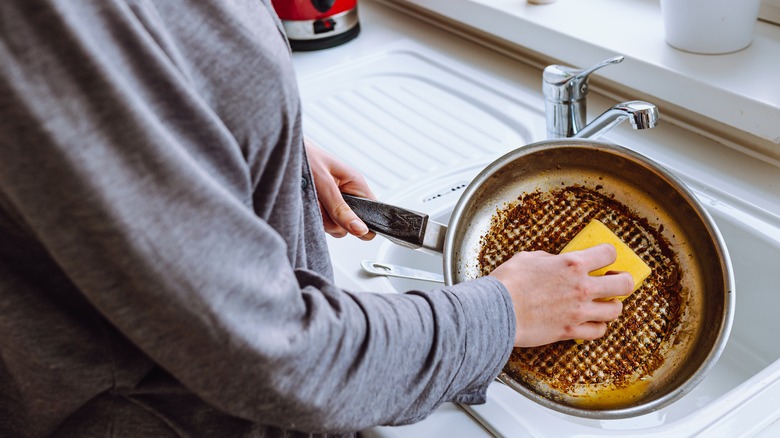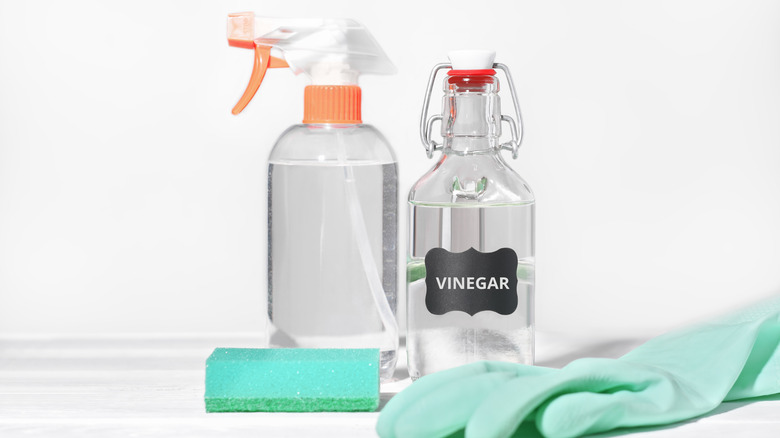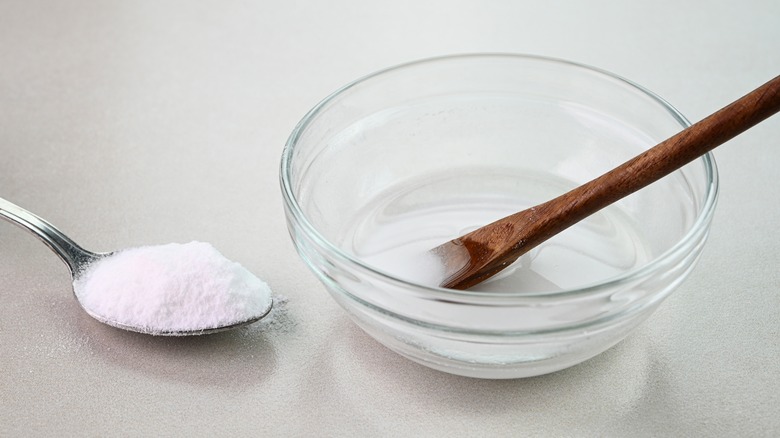Why Vinegar Isn't The Best Cleaner To Tackle Grease
Among the many cleaning hacks available today, vinegar stands out as a superb all-purpose and versatile cleaning tool for household chores due to its acidic composition. The mild acidity of vinegar makes it effective in breaking down mineral deposits, dissolving grime, and neutralizing unpleasant odors. Recognized for its natural disinfectant properties, vinegar is a reliable choice for sanitizing various surfaces. Its eco-friendly nature, affordability, and ability to tackle tasks like glass cleaning, surface disinfection, and deodorizing all make it a popular choice to use around the home. Vinegar remains a non-toxic, budget-friendly alternative to commercial cleaning products, making it a staple for keeping your house clean. That all being said, one of vinegar's few shortcomings is its inability to tackle grease.
Whether it's a terrific, oily splatter that has cascaded across your stovetop, a cheesy explosion inside your oven, or a rogue olive oil mishap on your apron, do not turn to vinegar for a quick solution. Vinegar excels at tackling kitchen-related stains such as hard water spots on faucets, wine stains on your carpet, and cloudy film on glassware. Its acidic nature effectively breaks down these stains, restoring shine and clarity. Moreover, vinegar can be useful for eliminating lingering odors in the kitchen, like those from cutting boards or food containers. However, for stubborn grease stains, dedicated degreasers or dishwashing detergents are often better choices for successfully removing these types of stains as vinegar's properties do not stand up to tough oils.
Why vinegar doesn't cut through grease
Vinegar is often a superhero for conquering difficult or particularly odorous endeavors, so it is definitely surprising to know that it isn't effective in cutting through grease stains. Simply, it's because vinegar and grease don't really get along. Grease is a stubborn, water-resistant shield made of fatty acids. Vinegar, on the other hand, is mostly water with a bit of acid called acetic acid. Since grease repels water and vinegar is mostly water, vinegar is unable to penetrate greasy stains.
Acids, including acetic acid in vinegar, are not well-suited for breaking down grease because they lack the necessary properties to emulsify or dissolve the water-resistant nature of fats. While acids can react with certain components of grease, they do not have the ability to efficiently break down the entire structure. So resorting to just vinegar to address greasy stains in your kitchen or on your linens will likely result in ineffective scrubbing and time-consuming frustrations.
On the other hand, detergents and soaps are more effective against grease. They contain molecules that allow them to surround and dissolve the grease, loosening it from fabrics and surfaces and making it easier to rinse away with water. Therefore, while vinegar can be a valuable cleaning agent for various purposes due to its acidity, its inability to efficiently break down the hydrophobic nature of grease limits its effectiveness in cutting through greasy residues.
Cleaning alternatives that will cut through grease
While vinegar may not be your best choice for tackling grease stains, there are a number of alternatives that work well that you probably already have at home. First, dishwashing detergents are powerhouse cleaners when it comes to cutting through grease. They contain surfactants, which are molecules with water-repelling and water-attracting components. These surfactants work to break down the greasy molecules into smaller, more manageable bits. This combination makes dishwashing detergents highly effective in removing grease from dishes, surfaces, fabrics, and even appliances.
Another great option is baking soda. It's an excellent, mildly abrasive cleaner that can help combat grease stains. When mixed with water, baking soda forms a paste that can be applied to greasy surfaces, scrubbing away the grease without causing damage. Baking soda also has alkaline properties, which can help neutralize and break down the acidic components of grease. This dual-action makes it a versatile and eco-friendly option for addressing grease stains on stovetops, ovens, and kitchen counters.
Finally, citrus-based cleaners, derived from citrus fruits like lemons or oranges, contain natural solvents such as d-limonene. These solvents are effective at breaking down grease by dissolving the bonds holding the grease molecules together. The citrusy components add a pleasant fragrance while providing degreasing power. These cleaners are particularly useful for cutting through greasy residues on surfaces, kitchen appliances, and even dishes. The natural ingredients make citrus-based cleaners a safer and environmentally friendly alternative for those seeking effective, grease-fighting solutions.


